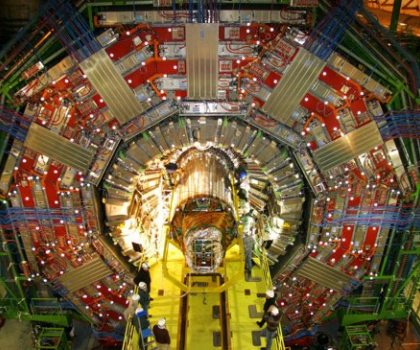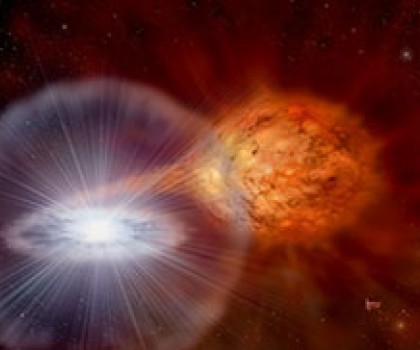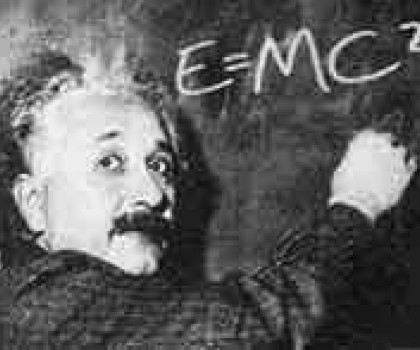Master of Science in Physics and Astronomy
LET'S GET PHYSICAL!
Physicists and astronomers try to understand nature: from the smallest building blocks of matter and their interactions to the evolution of the universe at a cosmological scale. Ultimately, this endeavour leads to new insights that are helpful in other scientific disciplines, and to many applications in our daily lives as well. Although our insights go ever deeper and reach ever further, there is much we still fail to understand. That is why basic research remains so important.
Physics and Astronomy research at Vrije Universiteit Brussel (VUB) covers a wide spectrum: experimental elementary particle research, theoretical research on elementary particles and cosmology, applied research on semiconductor lasers, metamaterials, and also the study of the principles of biological systems; and let us not forget astronomy and astrophysics where we look at binary star systems and how high-energy cosmic rays are produced in supernova explosions and black hole jets. And so, physics indeed reconciles the knowledge of the infinitely small and the infinitely large... and many things in between as well.
The VUB takes advantage of its unique position in the capital of Belgium and Europe. One of the strong points of the Master's programme at VUB are the close connections to many internationally renowned research groups and the links with other departments both within VUB, like engineering (photonics) bio-engineering and biology, as well as with our alliance partner Universiteit Gent and our sister university Université Libre de Bruxelles and many other universities in Belgium and abroad.
In our Master of Science in Physics and Astronomy (2 years, 120 ECTS, jointly organised with Universiteit Gent), teaching is done in small groups, with a strong component of personal interactions between teaching staff and students. Around 50% of our graduates currently move on to a PhD. Apart from a focus on Research, we also offer the Minor in Economy and Business and it is possible to study towards a degree in physics education in the dedicated educational master (in Dutch) which includes a substantial fraction of the physics curriculum.
STUDENTS AS SCIENTISTS
The offered courses are strongly embedded in ongoing research programmes. Through intensive collaboration with team members of the different research groups, you will get the opportunity to develop and improve your scientific skills. Our researchers at VUB have strong connections both within Belgium (UGent and ULB) and in- and outside of Europe through research projects, such as leading and visible presence in the IceCube Neutrino Observatory in Antarctica and the CMS experiment at CERN. Many of our students have the opportunity to an internship or research for their Master's thesis in Geneva during their studies. This close connection to research means our students are well-prepared for a PhD-position, with around half of our graduates pursuing such a career in research.
SCHOLARSHIP OPPORTUNITIES
For students joining the Master Physics and Astronomy with a non-Belgian bachelor diploma and with an excellent academic record, there are opportunities to apply for a scholarship covering all university registration costs. More information can be obtained in the process of the application with the VUB.
2 MINORS, 1 DEGREE
This MSc programme combines the expertise in research of both the Vrije Universiteit Brussel (VUB) and Ghent University (UGent). This allows you to tailor your study programme according to your interests.
One choice you have to make beforehand, and that is which of our minors you want to follow: Research or Economy and Business. No matter which minor you choose, you have the same degree, you will have a solid formation as a physicist and we offer you the possibility to participate in high-level research. The large majority of students choses the Research minor, but here is no wrong choice!
Structure
The programme consists of the following components:
- mandatory courses (30 ECTS)
- minor (60 ECTS):
- mandatory courses
- electives
- mobility / internship (mandatory for Minor Research)
- Master's Thesis (30 ECTS)
Some examples of electives:
Electroweak and Strong Interactions; Capita Selecta in Particle Physics; Simulation of Physics Phenomena and Detectors in Modern Physics; Physics and Chemistry in Nanostructures; Advanced Field Theory; Extensions of the Standard Model; Medical Physics; Capita Selecta Solid-state Physics; Optical Spectroscopy of Materials; Atomic and Molecular Physics; Radio Astronomy; Waves and Patterns in the Biophysics of Complex Systems; Early Universe Cosmology; Astroparticle Physics; Evolution of Stars and Stellar Systems; Nonlinear Dynamics and Chaos.
EXTERNAL MOBILITY
If you choose the Minor Research, you will have to take up two 'External Mobility' courses. This means you can follow courses at another university or do an internship at a company or a research institution. A combination of courses and internship is also possible, since there are two Mobility modules to take up. The internship will be assessed through a report and presentation.
For an overview of all Master courses, click here.
Click here to take a look at an example timetable.
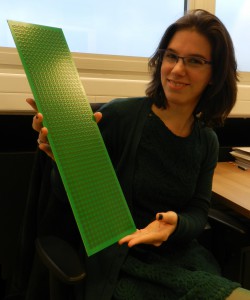
The main advantage of the physics programme at the VUB, boils down to this: there is room for exploration, flexibility and freedom, going beyond the box of compulsory courses. Next to the compulsory course on general relativity, I really enjoyed several optional courses in solid state physics and electromagnetism, both inside and outside of the VUB. The Physics and Astronomy programme encourages its students to also look beyond the borders of VUB, with “mobility” courses or internships. Many of my fellow students benefitted from the expertise in astrophysical high energy physics, theoretical physics and applied physics to participate in internships at CERN (optimising detectors) and others.
My Master's thesis and optional courses introduced me to the ideas that are now part of my PhD project in applied physics. Very recently, the geometrical techniques of general relativity are used to describe the interaction of light with artificially structured materials in an elegant way, leading to revolutionary optical devices such as "Harry Potter" invisibility cloaks. In my PhD, I hope to deepen this geometrical link with combined analytical and numerical insights, by including the nonlinear feedback due to gravitation and by extending it to the quantum world.
Sophie Viaene, alumna, awarded Robert Brout Prize
I had the opportunity to spend the summer between my two Master years at the central IceCube-lab in Madison, Wisconsin. IceCube is a neutrino observatory located at the geographic South Pole. When neutrinos interact with the ice they produce electrically charged secondary particles that in turn emit Cherenkov light, as a result of traveling through the ice faster than light travels in ice. The IceCube sensors collect this light, which is subsequently digitised and time stamped. This information is converted into light patterns that reveal the direction and energy of muons and neutrinos.
For my Master's thesis I was very actively involved in the Dark Matter research the Brussels IceCube group is doing. I searched for an excess of neutrinos from the direction of the Sun, as that could point to a Dark Matter population in the Sun. Unfortunately, no no neutrino excess from the direction of the Sun has been seen yet, so we need to keep searching!
Jan Kunnen, alumnus
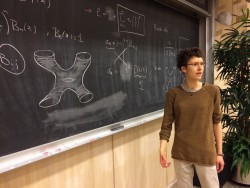
Doing a PhD was something I had at the back of my mind from the first year of my studies, but it was only later during my Bachelor's and Master's Thesis that this plan became more concrete and attractive. Doing a Phd would enable me to combine creativity - exploring new and existing concepts - and engaging challenging problems. For my research I explore models in String Theory that have the attractive property of being very symmetrical. Just like a round and even sphere has more symmetry to it than any random, often uneven, stone you pick up. For a theoretical physicist this symmetry opens doors to the ability of computing and thus knowing everything of the world the model describes.To understand and describe these models in an efficient and insightful manner, you first need a serious mathematical and - of course - physical background. These I have built up gradually during my studies at VUB.
As a first year PhD student, I also have the opportunity to expand my knowledge and skills during a Solvay doctoral school that takes place in different cities in Europe. I cannot wait to get started!
Saskia Demulder, alumna

